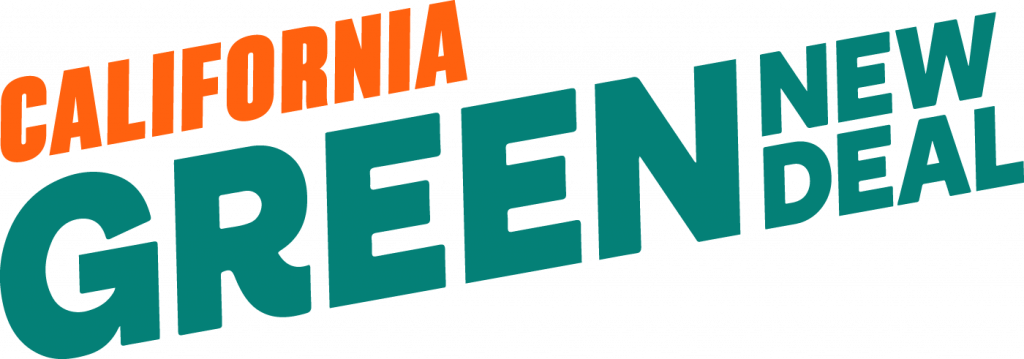Greenlined Policies
California’s communities of color and low-income communities need Greenlined policies to combat the lasting legacy and harms of redlining.
The systemic injustices Greenlined policies seek to deconstruct are deeply interconnected. To build an economy that is cooperative, sustainable, fair, participatory, and healthy, we are focusing our 2024-25 Legislative Agenda on the intersections between economy, climate, and race.

Sponsored Legislation
Our transportation system sits at the critical nexus between race, climate, and the economy, informing the health, wealth, and opportunities within our communities. From how transportation funding is allocated, to where heavily polluted highways versus clean mobility infrastructure like electric rails and EV charging stations are located, equitable transportation policies can shape our communities for the better.
AB 2086: Transportation Accountability Act (Schiavo)
With billions of dollars spent annually on transportation in California, it’s crucial to ensure these investments align with the state’s goals for safety, equity, climate action, and economic prosperity. But despite federal and state mandates to build towards a more equitable and sustainable transportation system, California does not have standardized data-driven systems or processes in place to understand how transportation investments support these goals.
AB 2086 addresses the lack of transparency and accountability in California’s transportation investments by requiring comprehensive tracking and reporting on how these investments align with the state and federal transportation goals.
This bill would require the California Department of Transportation to annually report and transparently describe how they are advancing each of their “Core Four” strategic priorities (Safety, Equity, Climate Action, and Economic Prosperity) and any other future priorities that are set by the state. This will serve as an essential tool to ensure California’s transportation future provides benefits to communities of color and low-income communities that bear the greatest burdens of transportation inequities.
Resources
- AB 2086 Department of Transportation Funding
- Press Release: Assemblywoman Pilar Schiavo Introduces Bill to Bring Transparency and Accountability to California’s Transportation Investments
AB 2086 Co-Sponsor Partners
AB 2535: Invest in Clean Air Act (Bonta)
Ever-expanding highways disproportionately burden communities of color and low-income communities with pollution, and do not result in reduced traffic congestion in the long-term. At the same time, highway expansion projects are costly and take away critical funding that could be used to support sustainable transportation infrastructure.
AB 2535 would reform how funding is allocated through the Trade Corridor Enhancement Program (TCEP)–a program in California that funds transportation infrastructure used to support trade and goods movement. AB 2535 reinvests 50% of TCEP funds to support charging infrastructure and electric rail projects, while limiting freeway expansion projects in communities overburdened by pollution. This bill will also direct the California Transportation Commission to adopt a transparent process to evaluate projects, ensuring that decisions are made with full accountability and consideration of economic and health benefits, with a specific focus on impacts in disinvested communities.
By reforming TCEP’s funding structure, and reprioritizing dollars that would be used to invest in harmful highway expansion projects to instead invest in clean transportation infrastructure, AB 2535 will ensure California is investing in cleaner air for our communities, more reliable transportation options to connect our communities to economic opportunities, and greater transparency and equity in our transportation system.
Resources
AB 2535 Co-Sponsor Partners
- Coalition for Clean Air
- Communities for a Better Environment
- Environment California
- Natural Resources Defense Council
AB 2401: Clean Cars 4 All Modernization (Ting)
California’s Clean Cars for All (CC4A) program is a set of initiatives aimed at retiring and replacing high-polluting vehicles to meet our state’s emission reduction goals. CC4A is a critical tool that invested billions in California’s transition to cleaner transportation.
However, currently only the five regional programs are held to equity, funding, and tax exemption provisions, creating inequality amongst the six programs.
AB 2401 will expand and focus CC4A to better prioritize supporting communities of color and low-income communities to transition to cleaner transportation. This bill updates the program’s guidelines to allow additional air districts to participate, ensure targeted outreach, and increase ZEV incentives for low-income, high-mileage drivers with older, and high-polluting vehicles. These changes will ensure the benefits of CC4A reach the communities that face the highest barriers to switching to zero-emissions vehicles, and endure the worst consequences of vehicle pollution.
Resources
AB 2401 Co-Sponsor Partners
BUDGET PRIORITIES
2024-25 California Budget Priorities
Economic downturns have the harshest impacts on communities of color and low-income communities that are already struggling to make ends meet. In the face of rising costs, climate crisis, and widening racial health, wealth, and opportunity gaps–now is the time to fortify resilience in underserved communities, not delay or cut back already underfunded equity programs.
We are urging the California Governor and Legislature to make the following investments to help our communities build resilience and meet the challenges we face today:
- Restore $200 Million to Transformative Climate Communities Program to Uphold Commitment Made in the Historic 2021 California Climate Commitment. TCC is a nationally recognized program that turns community priorities into impactful neighborhood-scale climate projects in communities most impacted by poverty and pollution. Despite overwhelming support for the program from advocates and communities across California, the program was zeroed out in 2023, and in the Governor’s January 2024 proposed budget, cutting over $200M in critical funding for the program. We urge the Governor and Legislature to restore investments for this proven climate justice model through the Greenhouse Gas Reduction Fund (GGRF), the original funding source of this historic program.
- Restore $9.8 million for Strategic Growth Council’s (SGC) Regional Climate Collaboratives (RCC) Program. The SGC was preparing to announce awardees for Round 2 of this critical capacity building program in early 2024. Communities had already spent considerable time, energy and resources preparing for and applying for the RCC grant, and it is highly unacceptable to cut the funding right as it was about to reach communities. The Governor must restore this funding back to the RCC program, which aims to build capacity in disinvested communities to leverage climate investment opportunities.
- $3 million for FY 2024-25 to the California Air Resources Board for the implementation of SB 253 (Wiener, 2023), a globally recognized emissions disclosure standard.
- Avoid further delays and cuts to the Zero-Emission Vehicle (ZEV) Package, while ensuring all FY 2023-24 funding is awarded. Any additional delays or cuts will further set back the state in supporting low-income and disadvantaged communities benefit from ZEVs. The state must also avoid going after unencumbered funds from FY 2023-24 to fill budget gaps.
Resources
Coalition Partners
Greenlining is a proud member of the following coalitions


Contact
For more info: Melanie Morelos, California Strategy Senior Program Manager, melanie.morelos@greenlining.org
For press inquiries: Danielle Bell, Media Relations Senior Program Manager, danielle.bell@greenlining.org
Follow us on social media to stay updated on the latest legislative advocacy and progress: Instagram, X/Twitter, Facebook, LinkedIn, and TikTok
To learn more about The Greenlining Institute’s California Legislative Agenda, please visit our blog.




